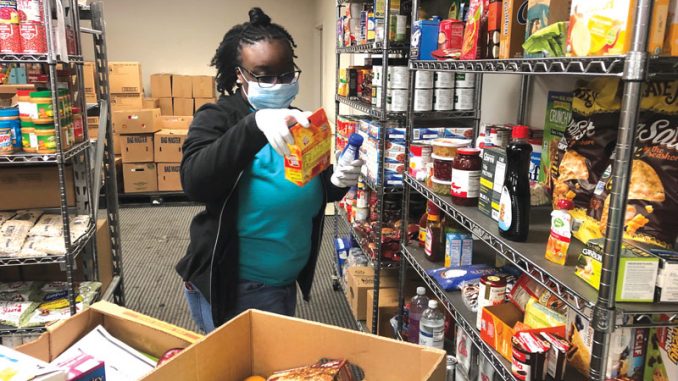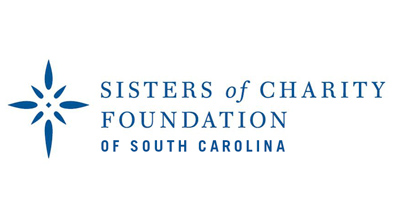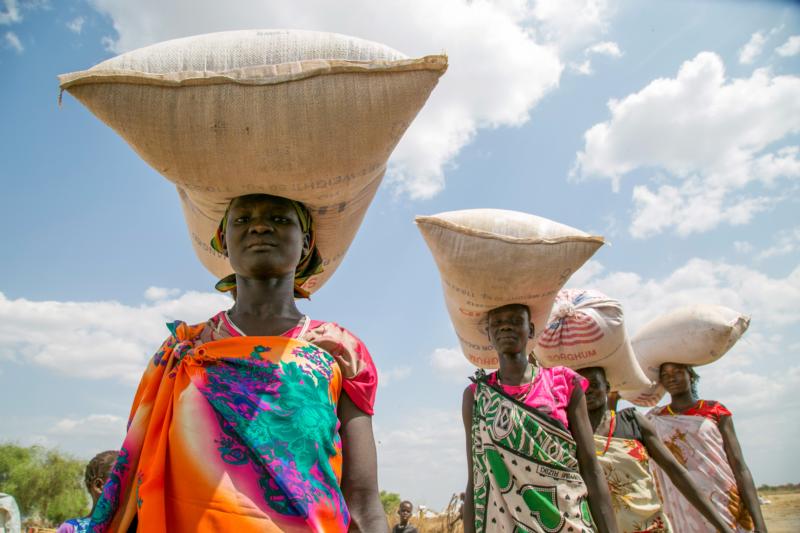
As Christmas approaches, volunteers at food pantries and food banks around South Carolina are helping thousands of people facing hunger and food insecurity, a chronic problem made worse this year by job losses caused by the pandemic.
Even before businesses were shut down in the spring, statistics showed that, on average, more than 600,000 South Carolina residents face hunger at any given time. Of that figure, more than 178,000 are children, according to figures compiled by Feeding America, a nonprofit network made up of more than 200 food banks nationwide.
Those numbers break down to about 1 in 8 people in the state struggling with food insecurity, including one in six children. Those numbers worsened as people around the state became newly unemployed because of the virus and as more children were forced to stay home from school.
During the ongoing pandemic, food pantries around the diocese are seeing consistent requests for food assistance, but thankfully not seeing drastic spikes everywhere.
For example, the Catholic Charities office in Georgetown County saw food requests double from October to November, and the Hardeeville location has seen an uptick in food needs since the spring, according to Michele Corkum, regional coordinator for the agency.
However, offices in Charleston and the Upstate have not seen as big a surge recently like they did when the pandemic first hit, although the need is still high. At the agency’s Pee Dee office based in Conway, the need for food goes up and down week to week, Corkum said.
At Our Lady of the Valley Catholic Center in Gloverville, however, need has consistently been higher at the agency’s office, which has seen a 55 percent increase in new clients, according to site administrator Joely Leguizamon. Many of the new clients are large families with children, and grandparents who are now raising grandchildren.
All Catholic Charities offices are seeing a surge in requests for financial assistance with rent and utilities, Corkum said. To make matters worse, people are facing possible evictions after the New Year as a nationwide ban on evictions by the Centers for Disease Control and Prevention expires Jan. 1.
Robert Keeder, who runs the St. Vincent de Paul chapter at the Basilica of St. Peter in Columbia, said the number of hungry people they serve at monthly meals for the needy has actually dropped this year because of concerns about the pandemic. Needs are still great, but not as many people are showing up. Instead, some homeless clients stay inside local missions or other housing facilities to receive meals.
The annual Thanksgiving meal, which Keeder’s group runs alongside volunteers from Columbia’s First Baptist Church, also saw a small decrease in crowd numbers and in the number of to-go meals that they sent out because of the virus. However, hundreds of people were still served and they also expect a good turnout for their annual Christmas meal.
Meanwhile, more than 100 people a week are showing up for a drive-through pantry run by the St. Vincent de Paul Society at St. Michael Church in Murrells Inlet. This is a significant increase from earlier in the year, according to ElLana Leonard, president of the St. Michael Conference.
The pandemic has also led about 55 families per month to seek help at a drive-up pantry run by the assistance ministry at Corpus Christi Church in Lexington, according to coordinator Dolores Aleixo. She said most families have three or four people in them, and there has been an increase in the number of multigenerational households and grandparents raising grandchildren.
Besides food aid, Keeder, Leonard and Aleixo said their ministries are also seeing an increase in people needing help with utility bills and rent.
“Whatever they need, it’s just a blessing to be able to help people right now,” Aleixo said.
To help the hungry in South Carolina, one of the best ways to do so is to donate to Catholic Charities. The agency’s offices offer a variety of assistance programs, including drive-up food pantries in Charleston, Gloverville and Conway.
People may also donate food or funds to their local St. Vincent de Paul society, or to other food pantries and outreach ministries run by parishes.



